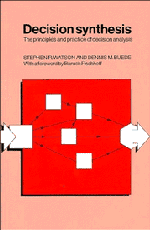6 - ANALYTIC STRATEGY
from PART II - PRACTICE
Published online by Cambridge University Press: 16 September 2009
Summary
INTRODUCTION
The initial discussion between the decision analyst and the decision-maker is pivotal in determining whether the analyst will get a chance to “practice his wares.” During this discussion the analyst must ascertain the nature of the decision, the concerns of the decision-maker, and the problems that he is likely to encounter during the course of the analysis. By the end of the discussion the analyst must have described an analytic process that assures the decision-maker that his concerns will be addressed. During the course of the discussion the analyst must tailor his approach to the decision-maker and his organization, the nature of the decision, and any potential problems. This tailored process must convince the decision-maker that the process will be worth his while. In a nutshell the analyst must convince the decision-maker that the analytic process can be expected to produce new insights into his decision that will be worth the time and money being spent by the decision-maker.
The analyst must always remember that it is these insights (as to which alternative best addresses the decision-maker's uncertainties and values) that the analyst has to offer. And it is the analytic process (in which the decision analysis paradigm is imbedded) that will produce these insights.
Information
- Type
- Chapter
- Information
- Decision SynthesisThe Principles and Practice of Decision Analysis, pp. 123 - 162Publisher: Cambridge University PressPrint publication year: 1988
